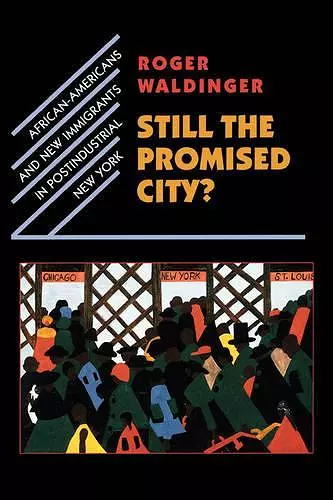Still the Promised City?
African-Americans and New Immigrants in Postindustrial New York
Format:Paperback
Publisher:Harvard University Press
Published:15th Dec '99
Currently unavailable, and unfortunately no date known when it will be back

Still the Promised City? addresses the question of why African-Americans have fared so poorly in securing unskilled jobs in the postwar era and why new immigrants have done so well. Does the increase in immigration bear some responsibility for the failure of more blacks to rise, for their disappearance from many occupations, and for their failure to establish a presence in business?
The two most popular explanations for the condition of blacks invoke the decline of manufacturing in New York and other major American cities: one claims that this decline has closed off job opportunities for blacks that were available for earlier immigrants who lacked skills and education; the other emphasizes "globalization"--the movement of manufacturing jobs offshore to areas with lower labor costs. But Roger Waldinger shows that these explanations do not fit the facts. Instead, he points out that a previously overlooked factor--population change--and the rapid exodus of white New Yorkers created vacancies for minority workers up and down the job ladder. Ethnic succession generated openings both in declining industries, where the outward seepage of whites outpaced the rate of job erosion, and in growth industries, where whites poured out of bottom-level positions even as demand for low-level workers increased. But this process yielded few dividends for blacks, who saw their share of the many low-skilled jobs steadily decline. Instead, advantage went to the immigrants, who exploited these opportunities by expanding their economic base.
Waldinger explains these disturbing facts by viewing employment as a queuing process, with the good jobs at the top of the job ladder and the poor ones at the bottom. As economic growth pulls the topmost ethnic group up the ladder, lower-ranking groups seize the chance to fill the niches left vacant. Immigrants, remembering conditions in the societies they just left, are eager to take up the lower-level jobs that natives will no longer do. By contrast, African-Americans, who came to the city a generation ago, have job aspirations similar to those of whites. But the niches they have carved out, primarily in the public sector, require skills that the least educated members of their community do not have. Black networks no longer provide connections to the lower-level jobs, and relative to the newcomers, employers find unskilled blacks...
A devastating refutation of the mismatch thesis, which assumes that the decline of manufacturing jobs has doomed inner-city blacks. -- Fred Siegel * Wall Street Journal *
Waldinger avoids facile generalizations about immigrants taking jobs that poor Americans (read African Americans) 'ought' to have...[He] offers tough (though not jargon-ridden) sociological analysis. -- Edward Countryman * Washington Post Book World *
A pathbreaking empirical and theoretical contribution. Using incredibly nuanced empirical evidence, Waldinger describes and explains the tendency for groups to develop and to maintain job concentrations. He then assesses the impact of this finding on a wide range of theories about group disadvantage...All this is done with a minimum of jargon and a maximum of clarity, making for a volume that should be required reading for anyone interested in immigration. -- Suzanne Model * Contemporary Sociology *
In his deeply informed, penetrating analysis of race and work in New York's twentieth-century political economy, Roger Waldinger quickly takes issue with two prevailing paradigms. The first of these contends that the city's new service and information economies have no place for unlettered, unskilled minorities (the mismatch theory); the second argues that the proliferation of managerial and professional workers requires an enormous support cast of 'service' employees, of which minorities are an inordinate percentage (the world cities approach). Such arguments, Waldinger claims, create deus ex machina which miss the social paths through which people gain jobs or not...Waldinger's analysis is among the best-informed and sophisticated contemporary analysis of race and work in a twentieth-century metropolis that I have read. By privileging historical evidence above a universalistic theory, his conclusions that ethnic niches will sustain the animosities over work that have discoloured New York's past. His is not an optimistic opinion, but it is exceptionally well-grounded. This books will be of compelling interest to students of race relations in any city beyond New York, particularly, I think, London, the midland cities, and Cape Town. -- Graham Russelll Hodges * Ethnic and Racial Studies [UK] *
ISBN: 9780674000728
Dimensions: 225mm x 144mm x 22mm
Weight: 458g
384 pages